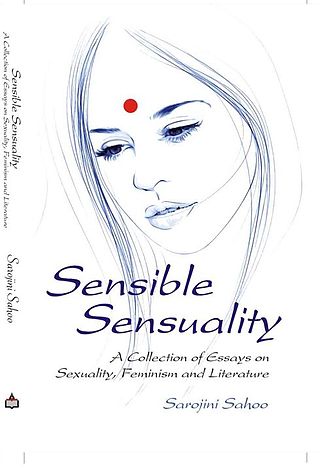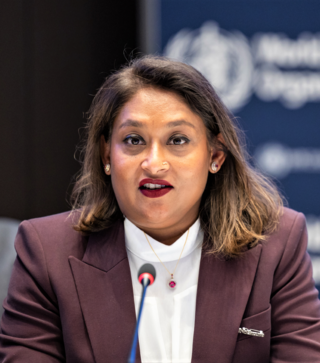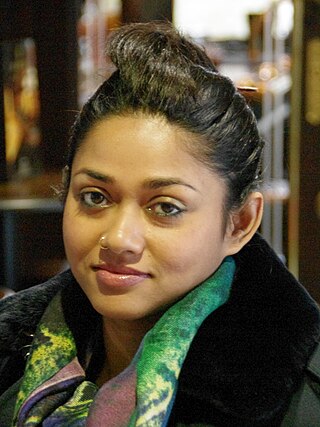Related Research Articles

The Vagina Monologues is an episodic play written in 1996 by Eve Ensler which developed and premiered at HERE Arts Center, Off-Off-Broadway in New York and was followed by an Off-Broadway run in at Westside Theatre. The play explores consensual and nonconsensual sexual experiences, body image, genital mutilation, direct and indirect encounters with reproduction, vaginal care, menstrual periods, prostitution, and several other topics through the eyes of women with various ages, races, sexualities, and other differences.

Rokeya Sakhawat Hossain, commonly known as Begum Rokeya, was a prominent Bengali feminist thinker, writer, educator and political activist from British India. She is widely regarded as a pioneer of women's liberation in India and Bangladesh.
The men's liberation movement is a social movement critical of the restraints which society imposes on men. Men's liberation activists are generally sympathetic to feminist standpoints.

Female Chauvinist Pigs: Women and the Rise of Raunch Culture is a 2005 book by Ariel Levy that critiques the highly sexualized American culture in which women are objectified, objectify one another, and are encouraged to objectify themselves. Levy refers to this as "raunch culture".

Sarojini Sahoo is an Indian feminist writer, a columnist in The New Indian Express and an associate editor of Chennai-based English magazine Indian AGE. She has been enlisted among 25 Exceptional Women of India by Kindle Magazine of Kolkata. and is an Odisha Sahitya Academy Award winner.
Feminist sexology is an offshoot of traditional studies of sexology that focuses on the intersectionality of sex and gender in relation to the sexual lives of women. Sexology has a basis in psychoanalysis, specifically Freudian theory, which played a big role in early sexology. This reactionary field of feminist sexology seeks to be inclusive of experiences of sexuality and break down the problematic ideas that have been expressed by sexology in the past. Feminist sexology shares many principles with the overarching field of sexology; in particular, it does not try to prescribe a certain path or "normality" for women's sexuality, but only observe and note the different and varied ways in which women express their sexuality. It is a young field, but one that is growing rapidly.

Lesbian, gay, bisexual, transgender, and queer (LGBTQ) people in Bangladesh face widespread social and legal challenges not experienced by non-LGBTQ people. Homosexuality is illegal under Bangladeshi law, which is inherited from the colonial British Indian government's Section 377 of 1860. According to the law, the punishment for engaging in same-sex sexual activities is imprisonment.

The Bangladesh Chhatra League, formerly known as the East Pakistan Student League, often simply called the Chhatra League, is a students' political organisation in Bangladesh, founded by Sheikh Mujibur Rahman on 4 January 1948. BSL is the student wing of the Bangladesh Awami League.

The Dark Abode is a collage presentation of South Asian feminist novelist Sarojini Sahoo's novel and American poet and painter Ed Baker's 23 sketches, which deal with terrorism that people often face from micro- to macrosphere.

Sensible and Sensuality is a collection of essay by Indian feminist writer Sarojini Sahoo. Published in 2010, the book contains the author's view on feminism. Sahoo is a key figure and trend-setter of feminism in contemporary Indian literature. She has been listed among 25 exceptional women of India by Kindle English magazine of Kolkata. For Sahoo, feminism is not a "gender problem" or confrontational attack on male hegemony and, as such, differs from the feminist views of Virginia Woolf or Judith Butler.
Alisha Pradhan is a Bangladeshi South Indian actress, television presenter, and businesswoman. She rose to prominence as a teenager on television. She later starred in several films, most notably with Emon in director Chashi Nazrul Islam's final two pictures, Antaranga and Bhul Jodi Hoy. Pradhan retired from acting in 2017.
Native American feminism or Native feminism is, at its root, understanding how gender plays an important role in indigenous communities both historically and in modern-day. As well, Native American feminism deconstructs the racial and broader stereotypes of indigenous peoples, gender, sexuality, while also focusing on decolonization and breaking down the patriarchy and pro-capitalist ideology. As a branch of the broader Indigenous feminism, it similarly prioritizes decolonization, indigenous sovereignty, and the empowerment of indigenous women and girls in the context of Native American and First Nations cultural values and priorities, rather than white, mainstream ones. A central and urgent issue for Native feminists is the Missing and murdered Indigenous women crisis.
Feminism in Bangladesh seeks equal rights of women in Bangladesh through social and political change. Article 28 of Bangladesh constitution states that "Women shall have equal rights with men in all spheres of the State and of public life".

Saima Wazed, also known as Putul, is the daughter of Bangladesh's Prime Minister, Sheikh Hasina. She is serving as the South East Asian regional director for the World Health Organization since November 1, 2023.

Rubaiyat Hossain is a Bangladeshi film director, writer, and producer. She made the films Meherjaan (2011), Under Construction (2015) and Made in Bangladesh (2019). In 2023, she becomes the second female director to win Bangladesh National Film Award for Best Director for Made in Bangladesh. Made in Bangladesh was listed in criterion collections hidden-gems of the 2010s. Hossain is currently working on her fourth feature film Difficult Bride. Hossain is also the founder Sultana’s Dream, a funding and mentorship grant to empower, promote and support the next generation of women filmmakers and storytellers in Bangladesh.

Sara Hossain is a Bangladeshi lawyer. She is a barrister in the Supreme Court of Bangladesh. She is the honorary executive director of the Bangladesh Legal Aid and Services Trust (BLAST), a major legal aid provider. She has been at the forefront of advocating for women's rights in Bangladeshi courts and played a key role in drafting legal reforms to protect women. She was the plaintiff's lawyer in the landmark case of Bangladesh National Women Lawyers Association (BNWLW) v. Bangladesh, in which the Supreme Court supported the judicial practice of referring to international human rights law in the absence of domestic legislation. She is known for her role in challenging fatwa violence when a fatwa is issued to mete out punishment to women and girls. She co-edited 'Honour': Crimes, Paradigms and Violence Against Women with Lynn Welchman.
Maleka Begum is a Bangladeshi feminist, author, academic.

Azmeri Haque Badhon is a Bangladeshi actress who has also worked in Bollywood. She rose to fame after being the 2nd runners-up at the Lux Channel I Superstar in 2006. Later, she made her film debut with a film called Nijhum Oronney in 2010 along with Ilias Kanchan and Champa. She has appeared in a number of TV dramas as well. She got her breakthrough in acting for her lead role at Rehana Maryam Noor (2021), the first officially selected Bangladeshi film in the “Un Certain Regard” section of the 74th Cannes Film Festival. She won Bangladesh National Film Award for Best Actress, the 14th Asia Pacific Screen Awards (APSA) in "Best Actress" category and the Hong Kong Asian Film Festival award in the New Talent category for this film.
Firdous Azim is a professor of English at BRAC University, a literary critic, and a women's rights activist. She is the chairperson of the Department of English and Humanities at BRAC University. She is a member of Naripokkho.
References
- ↑ "About Us – Bonhishikha – unlearn gender". unlearngender.com. Retrieved 2021-09-28.
- 1 2 Syeda Samara Mortada [Coordinator of Bonhishika] (1 September 2017). "Bonhishikha - Unlearn Gender". The Daily Star.
- 1 2 Rashid, Tawhidur (2021-03-07). "The F-Word: Feminism 2021". ICE Today. Retrieved 2021-09-28.
- 1 2 Namira Hossain [member of Bonhishikha]. "It's a SHE thing". New Age Xtra. Archived from the original on 24 November 2015.
- 1 2 "It's a SHE thing: Imagining a better world for women". Dhaka Tribune. 1 June 2015.
- 1 2 3 "About Us – Bonhishikha – unlearn gender". unlearngender.com. Retrieved 2021-09-28.
- ↑ "Good girls don't do that!". Dhaka Tribune. 24 August 2016.
- ↑ "Body shaming and weight stigma is predominant among Bangladeshi women and the struggle is indeed real". ICE Today. 13 August 2017.
- ↑ "Bonhishikha's Nari Nokkhotro touched upon the ordeals women in Bangladesh face on a daily basis. Here's a recap of the riveting performance". ICE Today. 21 August 2017.
- ↑ "'Spectrum of Choice' needs to be reclaimed". Dhaka Tribune. 2020-11-07. Retrieved 2021-09-28.